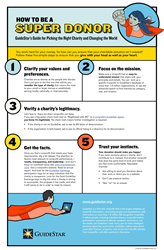Five Steps Help You Donate to the Right Charity and Become a Super Donor


Washington, DC (PRWEB) November 20, 2014
The arrival of the holidays marks the beginning of the “giving season,” the time of the year when many Americans donate their hard-earned money to charities. It is also the time of year when nonprofits increase their fundraising appeals to maximize the spirit of the season. When faced with so many solicitations, how can donors be sure that their money goes to the “right” nonprofit? The task of finding the highest-performing charity to support can be daunting, especially with concerns regarding Ebola-related charity scams.
“Whether you are donating to a charity to fight Ebola or want to support another cause, a few minutes of proactive research goes a long way,” said Lindsay J.K. Nichols, GuideStar’s senior director of marketing and communications. “It’s important to research before you donate to ensure you’re making the most of your donation.”
To help donors with this process, GuideStar, the largest source of nonprofit information, has created a guide to help people become “Super Donors”:
1. Clarify your values and preferences.
Charities are as diverse as the people who donate. Don’t just give to the first one that solicits you: consider the type of charity that means the most to you—small or large; startup or established; serving locally, nationally, or internationally.
2. Focus on the mission.
Make sure a nonprofit has an easy-to-understand mission that aligns with your principles and beliefs. You can look up a specific nonprofit on GuideStar’s database of more than 1.8 million organizations, or use the advanced search to find charities by category, size, and location. The mission should also be easily found on a charity’s website.
3. Verify a charity’s legitimacy.
Let’s face it: there are sham nonprofits out there, and some charities that used to be legitimately tax-exempt are no longer. Verifying that the IRS currently recognizes a nonprofit as legally registered if you want to make a tax-deductible donation. If you see a big green check mark next to “Registered with IRS” on a nonprofit’s GuideStar report, you know it’s legitimate. No check mark means further investigation is required.
If the charity is not on GuideStar, ask to see its IRS letter of determination.
If the organization is faith based (churches and other religious nonprofits are not required to file with the IRS), ask to see its official listing in a directory for its denomination.
4. Get the facts.
Once you find a nonprofit that meets your basic requirements, dig a bit deeper. Pay attention to factors most relevant to nonprofit performance—results, transparency, and leadership—and don’t focus on financial ratios. Financial responsibility is important, but ratios don’t indicate effectiveness (see www [dot] overheadmyth [dot] com). Visit a nonprofit’s website. Read its annual report. And look for a GuideStar Exchange participation logo for an easy indication that the charity is transparent. Look for the Gold GuideStar Exchange logo to dig into what a charity is aiming to accomplish, the progress it has made, and what it still wants to do in order to meet its mission.
5. Trust your instincts.
Your donation should make you happy! If you have concerns about a charity, don’t contribute to it. Instead, find another nonprofit that does the same kind of work and makes you feel more comfortable. Reputable charities:
Are willing to send you literature about their work or direct you to a website.
Don’t use pressure tactics.
Take “no” for an answer.
On Tuesday, December 2, 2014, GuideStar is joining a day dedicated to giving, #GivingTuesday. We invite you to become a “Super Donor” and take part in this day celebrating our great national tradition of generosity. #GivingTuesday will show how Americans can do much more with our wallets than just consume. Visit www [dot] givingtuesday [dot] org to learn more.
“People don’t have to know how to read a nonprofit’s regulatory document to become Super Donors,” added Nichols. “It’s not about the time you spend doing your research—it’s the fact you research that matters. GuideStar has organized critical information on every charity in America to help all of the Super Donors out there make smart giving decisions this holiday season.”
Visit GuideStar’s page dedicated to helping donors make the most of the giving season this year, and view the Super Donor infographic for more information.
About GuideStar
GuideStar, www [dot] guidestar [dot] org, is the largest database of nonprofit information, connecting people and organizations with information on more than 1.8 million IRS-recognized nonprofits. Some 7 million people, including individual donors, nonprofit leaders, grantmakers, government officials, academic researchers, and the media, use GuideStar’s data every year to make intelligent decisions about the social sector. A 501(c)(3) nonprofit, GuideStar collects its information from the IRS, directly from nonprofits, and other partners in the nonprofit sector. GuideStar is a participant in the Combined Federal Campaign, CFC #75786.
Related Literature Press Releases